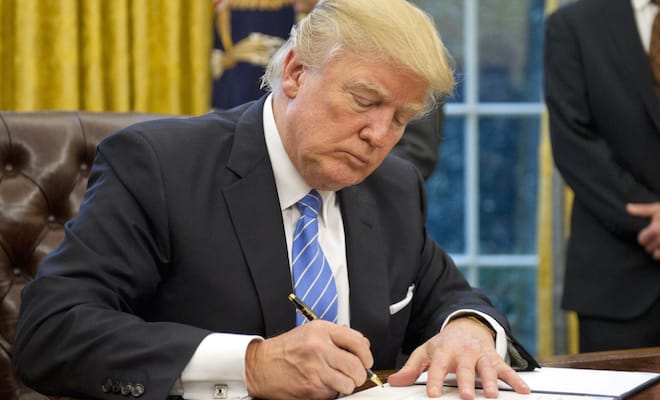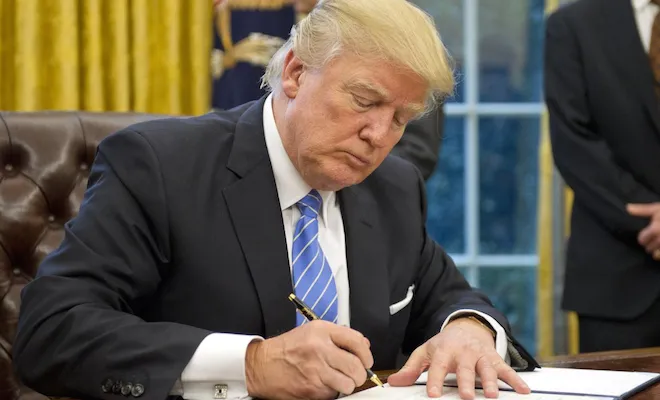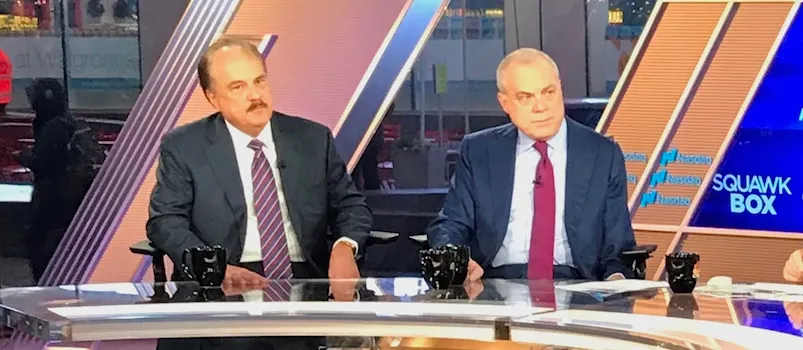
President Trump’s executive order targets ACA provisions on small-business health coverage and individual benefit plans.
WASHINGTON — After numerous failed attempts to repeal the Affordable Care Act, President Donald Trump has signed an executive order to relax standards on small businesses that band together to buy health insurance and may take steps to allow the sale of other health plans that skirt the health law’s requirements.
The Trump executive order directs federal agencies to study how to make it easier for small businesses, and possibly individuals, to join together to purchase health insurance.
Separately, it will allow consumers to buy short-term policies, which don’t have to comply with ACA’s protections for those with preexisting conditions. Also, it looks to broaden the ability of employers to give workers money to buy their own coverage. These changes could take six months or more to take effect.
The order, Trump said, would “cost the United States government virtually nothing and people will have great health care. And when I say people, I mean by the millions and millions.”
Supporters say these moves will make health insurance more affordable for millions of people. Critics worry that the order may free association health plans (AHPs) from several key ACA regulations and from state oversight, allowing them to sell plans with lower premiums but skimpier benefits across state lines. That could drain off younger and healthier customers from ACA and send premiums skyrocketing for sicker people left in the exchanges.
Trump’s actions aren’t likely to be his final say on ACA, which he’s unsuccessfully worked to dismantle since taking office. White House officials say Trump will consider additional executive actions to overhaul what they claim are the law’s deficiencies.
Trump’s efforts with congressional Republicans to repeal and replace ACA have foundered after analyses of the GOP replacement plans showed the number of Americans without insurance would increase by millions.
The order’s most far-reaching element will instruct a trio of cabinet departments to rewrite federal rules for AHPs — a type of insurance in which small businesses of a similar type band together through an association to negotiate health benefits.
It also is expected to expand the availability of short-term insurance policies, which offer limited benefits meant as a bridge for people between jobs or young adults who are no longer eligible for their parents’ health plans. The Obama administration ruled that short-term insurance may not last for more than three months; Trump is planning to extend that to nearly a year.
Trump’s action is intended to widen employers’ ability to use pretax dollars to help workers pay for any medical expenses, not just for health policies that meet ACA rules — another reversal of Obama policy.
The new policies also do not have to provide the 10 “essential health benefits” covered under ACA, including maternity care, emergency room visits, mental health treatment and others.
Trump’s move is likely to encounter opposition from medical associations, consumer groups and even insurers — the same coalition that has lobbied the GOP-controlled Congress against earlier repeal and replace efforts.
Senate Minority Leader Chuck Schumer (D., N.Y.) said Trump was taking a “wrecking ball” to the Affordable Care Act. “It will send costs soaring for older Americans and those with preexisting conditions.”
The move came three weeks before the November 1 start of the fifth open-enrollment season in ACA marketplaces for people who do not have access to affordable health benefits through a job. It is uncertain whether the departments — Health and Human Services, Treasury, and Labor — will finalize rules carrying out the order in time for new insurance to be sold for 2018.
Dave Ratner, owner of a small chain of beverage and pet-supply stores, represented the National Retail Federation at the White House as the president signed the document.
“The signing of this order will help level the health insurance playing field for small businesses across the country,” said Ratner, an NRF member and owner of Dave’s Soda and Pet City, based in Agawam, Mass. “By letting associations negotiate for their members, small businesses will finally be able to take advantage of better rates their employees can afford and provide better coverage in the process.”







